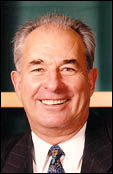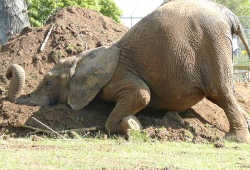Dorothy – 24/3/00
The Hon. Don McKinnon looks back on his twenty one years in Parliament.
|
|
| Don Mckinnon Photo source New Zealand National Party |
Before he left New Zealand to take up his new position as Commonwealth Secretary General Don McKinnon delivered his valedictory address to the New Zealand Parliament.
The timing of this valedictory address was unusual, being directly after maiden speeches to the House. He found these speeches refreshing to listen to and more enthusiastic than many earlier such addresses he had heard, probably, he thought, as a result of the multi-representation in the House. His own maiden speech had been delivered to a very different assembly in 1978. Parliament then was a very male institution, in that sense an environment to which he could adjust easily having been in a boys’ boarding school, had four months compulsory training in the New Zealand army, and worked part-time in Paremoremo Prison.
Service as a Member of Parliament Mr McKinnon served eighteen years as a constituent Member of Parliament for electorates on the Hibiscus Coast (north of the Auckland Harbour Bridge) and three years as a list MP.
The area which he represented was one of prodigious growth and he was present as its MP at the opening of seven new primary schools. This was in marked contrast with some southern areas in New Zealand where with the population drifting to the cities, especially in the north of the country, schools were being closed, not opened. Among the achievements he recalled in the period were the elimination of tolls on the Harbour Bridge and the bypass for the citizens of Orewa, promised twenty one years ago and opened in December 1999!
Two years after becoming a Member of Parliament Mr McKinnon was appointed a Whip and remained in that office for seven years. Later he became Deputy Leader of the National Party, and he found that many of his duties in that role were similar to those of the Whip. This meant that he spent about seventeen years with people management responsibilities. This made him ask himself the question, “What did he come to Parliament for?” He pointed out that Whips realise that they do not have the luxury of taking an extreme position on any subject, but rather need to stay fairly much in the centre in order to maintain that degree of credibility.
Advice to new backbenchers! Mr McKinnon believes that MPs learn much in the back bench, especially by their mistakes. One advice he always gives to new backbenchers is “Never judge a contest. Give out the prizes, but never be the judge. There are so many pitfalls.” On one occasion he judged a school fancy dress and unwittingly gave all the prizes to children from a commune which was far from popular with the National supporters in that electorate. He jokingly suggested that this was the cause of reduced support for him in that area in the next election.
Ministerial transport He recalled what happened when National became the Government in 1990. He and three other MPs lived in an old flat in Wellington and had travelled to and from work in a clapped out old Holden. All four became Ministers in the new Government – Foreign Minister, Minister of Pacific Islands, Leader of the House, Deputy Prime Minister. The old Holden was suddenly replaced by four Ministerial Crown limos. People roundabout looked out in shock. What could have happened? – a military takeover?
Being an MP a privilege to be taken seriously He emphasised the need for MPs not to take lightly the privilege of serving in the New Zealand Parliament. Especially if they have been MPs for a long time they need to remind themselves that they have been specially singled out by their Party or by the people.
The role of Foreign Minister He felt it an absolute honour to be the country’s Foreign Minister, because in that role he was carrying the label of New Zealand outside the country – “not quite up there with the All Blacks and Silver Ferns, but heading in that direction.” He acknowledged the valuable assistance of those who worked in the Department of Foreign Affairs, possibly one of the last career departments in the country. He hoped that the institutional memory coming from the experience of these highly competent people would not be lost but be retained as is possible in a career department.
Achievements as Foreign Minister Looking back on his years as Foreign Minister Mr McKinnon thinks that if he had made a particular contribution it was in encouraging his staff to look outside the square – to think outside the very core activities that are their responsibility. This, he believes, resulted in the establishment of the Asia 2000 Foundation, the Centre for Strategic Studies, and a very full open frontal campaign to win a seat on the Security Council. To those who said, ” I think we should play it low key, Minister, in case we lose,” Mr McKinnon’s reply was, “In politics if you’re going to win something you’ve just got to go all out, and it’s win or bust.”
MPs MUST have knowledge of the Pacific Island states. He values as another worthwhile achievement the trips around the South Pacific which he instigated about 1993, taking MPs, NGOs, defence people, and school pupils. They have had a great impact on the island states they visited and helped MPs to gain what Mr McKinnon regards as essential for them – some knowledge of the Pacific Islands. In his view MPs should not regard these island states as islands that they fly over on their way to America or East Asia, but every MP must have some knowledge of these islands.
Ambassadors need to share their knowledge of other countries. Ambassadors need to be pushed out on to the lecture circuit when they return home and before they get absorbed back into the Ministry as they have important stories to share. He also advocates pushing the new Foreign Affairs recruits out for a day with MPs. They have come back with interesting reports of a whole side of New Zealand that they would not otherwise see.
Ministers of Trade and Foreign Affairs need to travel extensively. The Foreign Minister is necessarily involved in a tremendous amount of travel. Mr McKinnon visited more than a hundred countries, many more than once. He had thousands of meetings with Foreign Ministers, Prime Ministers or Presidents, Kings and Queens, and most of them are referred to by critics, especially in the media, as “overseas junkets”. He would like the media to think about this test. The test should be that if the Foreign Minister and the Trade Minister each do not do one hundred days outside the country in the course of the year they are not doing their job. When they have done a hundred days then the media can start to criticise them, but they should refrain from criticism for the first hundred days. It is an absolute requirement to keep knocking on the door and ensuring that the New Zealand file gets dusted off, because most countries have the files of 180 countries there and New Zealand is just one of them. It is essential to keep working hard at that all the time.
New Zealanders’ work in Bougainville Mr McKinnon acknowledges that he has developed a very strong attachment to the island of Bougainville and suggests that he may be getting more credit than he deserves for what is happening there. He stresses that he has been involved with people who were very motivated to see something happen there and who “had iron constitutions to see it through” because it became clear early in the piece that when working with Polynesian and Melanesian friends they didn’t stick to the normal clock beginning at eight in the morning and having things “wrapped up” by five. It might take five years to be finished, but it is essential to keep working at it. In dealing with the island’s problems the Defence and Foreign Affairs staff all worked together as a team with effective communication.
Peacekeepers Mr McKinnon believes that New Zealanders can take great pride in the work of the excellent peacekeepers sent by New Zealand into places such as the Gulf, Kuwait, Somalia, Cambodia, Mozambique, Angola and Laos. “People often think of peacekeepers as wearing a cardigan and jandals and carrying a peace banner.” he said. “They are first and foremost highly trained combat soldiers who have been trained up to being a peacekeeper.”
For peacekeepers to function properly they must know that they are part of a comprehensive defence force with the army, navy and airforce backing them throughout. When the hostages were taken off Bougainville, which was part of the original Burnham agreement, a well armed New Zealand naval ship off Bougainville served as a deterrent to anyone who hesitated about complying with the terms of the agreement.
Foreign Minister’s role “The role of the Foreign Minister”, he said, “is all about protecting New Zealand’s interests and projecting New Zealand’s interests. There is always something of a natural conflict between what the Foreign Minister will want to say, whether you are saying something for domestic consumption, something for a home audience, or even something just to make yourself feel pretty good, as opposed to something you want to say that is getting a message out there. Most messages you want to put out as a Foreign Minister really have to be what you want the other country to hear, and that conflict is something that all ministers have to grapple with. Invariably of course you will get told that you should be saying more about a subject, but at the end of the day as Foreign Minister sometimes you are inclined to say, ‘One of your other ministerial colleagues could say that, but I am more concerned about a long term relationship with another country and that is the way it is going to
be.’ ”
New Zealand on the world scene As a nation New Zealand wants to be heard, be listened to, and taken seriously. We want what we say to be acted on and to have credibility. Mr McKinnon said that he hoped that New Zealand’s foreign policy in the last nine years had helped to achieve this and quoted Koffi Annan’s statement during his recent visit – “New Zealand definitely punches above its weight”.
Often as Foreign Minister Mr McKinnon was asked, “Why does New Zealand follow the policy of other countries instead of having an independent foreign policy?” His reply was, “That is not actually the question. It should be, ‘What are you doing that is good for New Zealand?’ ”
It is not important whether the policy is dependent or independent if it is good for New Zealand. Either a dependent or an independent policy could drive the country into bankruptcy, but policy should be based on what is good for New Zealand at the time, advances its interests and builds up credits overseas, because there are times when it is desirable to be able to draw on those credits. “3.8 million people don’t swing the same weight as the US or Europe or even Australia”, said Mr McKinnon, “so it is necessary to work hard at building up those credits.”
Recognition for Mr McKinnon’s work In the view of most New Zealanders this country earned sizable deposits in the credibility bank during Mr McKinnon’s time as Foreign Minister.





